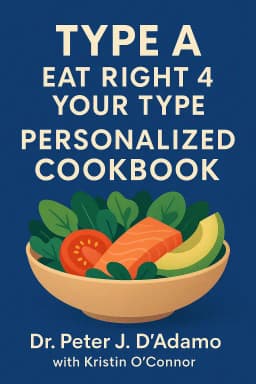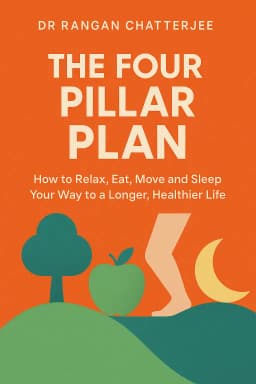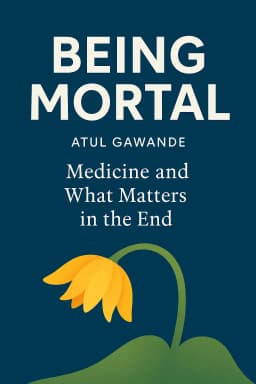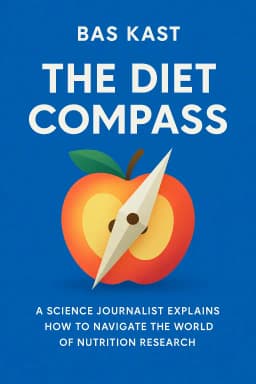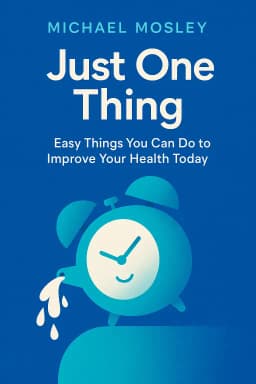
Brain Hacks & Body Clocks
Golden Hook & Introduction
SECTION
Laura: I'm going to start with a wild statistic. A Harvard study found that your ability to do press-ups can predict your risk of a heart attack with 96% accuracy. It's a better predictor than many standard medical tests. Sophia: Hold on, 96%? That’s absurdly high. You’re telling me a simple gym-class exercise is more powerful than a bunch of expensive medical equipment? Laura: That's exactly what the data suggests. And it perfectly captures the idea that our health isn't always about grand, complicated gestures. Sometimes, it's about tiny, weirdly powerful habits. Sophia: That feels like a much more manageable way to think about it. It’s less "I need to run a marathon" and more "maybe I should just be able to get off the floor without groaning." Laura: And that is the entire premise of the book we're diving into today: Just One Thing by Dr. Michael Mosley. Sophia: Ah, Michael Mosley. The guy who made intermittent fasting a global phenomenon. I find his story fascinating—he was a doctor who became a BBC journalist and then used himself as a human guinea pig after his own Type 2 diabetes diagnosis. He didn't just report on the science; he lived it. Laura: Exactly. He put his own body on the line to test these ideas. And what makes this book particularly poignant is that he passed away unexpectedly right after it was published, making it a final testament to his life's work: finding simple, science-backed ways for all of us to live healthier. It really frames these tips with a new sense of legacy. Sophia: Wow, that adds a layer of gravity to it. It’s not just a collection of health tips anymore; it’s his parting wisdom. Laura: It truly is. And one of his most powerful ideas, and where we should start, is this concept of the 'Intelligent Body'—the notion that tiny, targeted movements can have an outsized impact on our brain.
The 'Intelligent Body': How Micro-Movements Rewire Your Brain
SECTION
Sophia: Okay, 'Intelligent Body' sounds great, but it also sounds like marketing. What does it actually mean? Are you telling me I can think my way to being stronger? Laura: Almost the opposite. You can move your way to being smarter. Mosley’s book is packed with examples, but the most compelling one comes from a researcher named Professor Damian Bailey, who studies how exercise affects the brain. He was interested in what he calls 'intelligent exercises.' Sophia: And what makes an exercise 'intelligent' versus, I guess, 'unintelligent'? Laura: It’s about the impact on your brain, not just your muscles. We all know aerobic exercise like running is good for the heart. But Mosley points out that very few people do resistance exercises—things like squats and press-ups. After age 30, we lose about 5% of our muscle mass every decade unless we actively fight it. Sophia: That’s a terrifyingly fast decline. So, squats and press-ups are the answer? Laura: They're a huge part of it. Professor Bailey's research at the University of South Wales is where it gets really mind-blowing. His team had people do various exercises while they used advanced ultrasound to watch what was happening to the blood flow inside their brains, specifically in the hippocampus. Sophia: The hippocampus… that’s the memory and learning center, right? Laura: Precisely. And what they found was astonishing. While jogging provides a steady, consistent flow of blood to the brain, squats do something different. The up-and-down motion, fighting against gravity, creates a 'to and fro' pulsing of blood. It’s more like a form of interval training for your brain's arteries. Sophia: So it’s the intermittency, the change in pressure, that’s doing the work? It’s like you’re giving your brain's plumbing a workout. Laura: A perfect analogy. This pulsing action stimulates the release of a crucial molecule called BDNF—brain-derived neurotrophic factor. Mosley calls it 'Miracle-Gro for the brain.' It encourages the growth of new brain cells and strengthens the connections between them. Sophia: Okay, but here’s the part I’m struggling with. The book makes a really bold claim. Are you seriously going to tell me a few minutes of squats is better than a long run? Laura: I am. And this is a direct quote from Professor Bailey's research in the book. He found that doing just three to five minutes of squats, three times a week, was more effective for brain health than a brisk 30-minute jog three times a week. Sophia: Come on. That sounds way too good to be true. It feels like a life hack that’s designed to go viral, not one that’s based in solid science. What’s the catch? Laura: There isn't one, really. It’s about efficiency. The jog is great for your heart and lungs, but the intense, short burst of resistance from the squats provides a unique and powerful stimulus directly to the brain's growth mechanisms. You're not just building stronger legs; you are literally building a bigger, better-functioning brain. Sophia: That reframes the whole purpose of exercise for me. I always thought of squats as something you do to avoid having chicken legs. The idea that I’m doing it for my memory and focus is a much better motivator. Laura: And it’s not just squats. Remember that Harvard study on firemen I mentioned? They followed 1,000 firemen for ten years. The ones who could do 40 or more press-ups were 96% less likely to have a heart attack than those who could only do 10 or fewer. It’s a measure of overall strength and resilience. Sophia: So these simple, old-school bodyweight exercises are like a diagnostic tool and a prescription all in one. It’s not about looking good in a swimsuit; it’s about fundamental, long-term health. Laura: Exactly. It’s about maintaining the machinery. And Mosley’s point is that it’s never too late. The book highlights research showing that even people who start these exercises late in life see significant brain and body benefits. Sophia: Okay, so the type of movement matters more than the duration. That makes me wonder... does the timing of our other habits matter just as much? Because the book is structured around the clock, from morning to night. Laura: You’ve just hit on the second major pillar of the book. It’s not just what you do, but when you do it. This is the idea of the 'Chronobiology of Health.'
The 'Chronobiology of Health': Hacking Your Body Clock
SECTION
Sophia: Chronobiology. That sounds intimidatingly scientific. Laura: It just means the biology of time—your body's internal clock, or circadian rhythm. Mosley argues that aligning our habits with this clock can unlock incredible health benefits, often without changing anything else. The best example he gives is about when we eat. Sophia: Oh boy, here we go. He’s going to tell me to stop my late-night snacking, isn’t he? Laura: He is, but the science behind it is fascinating. He talks about a form of intermittent fasting called Time-Restricted Eating, or TRE. This isn't about what you eat, but creating a consistent window of time each day when you eat. For example, eating all your meals between 10 AM and 6 PM. Sophia: That sounds… difficult. Especially the no-food-after-6-PM part. Why does it matter so much? Laura: To explain it, Mosley points to a landmark study on mice from the Salk Institute, led by Professor Satchin Panda. It’s a brilliant, simple experiment. They took two groups of mice and fed them the exact same high-fat, sugary diet—basically, a terrible mouse diet. Sophia: Okay, so both groups are on a path to poor health. Laura: You'd think so. But there was one difference. The first group could eat whenever they wanted, day or night. The second group had to eat all their food within an eight-hour window. They ate the same number of calories, just in a compressed timeframe. Sophia: Let me guess. The eight-hour-window mice did better. Laura: They didn't just do better; the results were staggering. After 100 days, the mice who ate whenever they wanted were obese and had developed high cholesterol, high blood sugar, and liver disease. The mice who ate in the eight-hour window? They were protected from all of it. They were lean and healthy. Same food, same calories, completely different outcomes. Sophia: That’s actually insane. So you're saying the same bag of chips at 3 PM is fine, but at 11 PM it's a metabolic disaster for my body? Laura: In essence, yes. And the reason comes down to our circadian rhythm. Dr. Emily Manoogian, another researcher from the Salk Institute featured in the book, explains it perfectly. During the day, your body is primed for activity: eating, digesting, moving. At night, it’s supposed to switch into a state of rest and repair. Sophia: But if you eat late, you’re forcing it to stay in work mode. Laura: Exactly. Your body has to focus on digesting that late-night pizza instead of repairing cells, consolidating memories, and cleaning out toxins. Your blood sugar and insulin levels spike at a time when they should be low, which over time contributes to weight gain and disease risk. You’re essentially giving your body metabolic jet lag. Sophia: Metabolic jet lag. I love that phrase. It perfectly describes that sluggish, out-of-sync feeling after a late meal. So the advice is to finish eating three to four hours before bed? Laura: That’s the golden rule from the book. It gives your body time to digest before it shifts into its crucial nighttime repair cycle. And this principle of timing applies to so many other things. Mosley talks about taking a hot bath. Most people think it’s just for relaxation. Sophia: I mean, it is. A hot bath is one of life’s great pleasures. Laura: It is, but when you take it matters. The book cites research showing that taking a hot bath about 90 minutes before bed can dramatically improve your sleep quality. Sophia: How does that work? A hot bath seems like it would wake you up. Laura: It’s a clever trick. The hot water raises your body temperature, but when you get out, the rapid cool-down that follows sends a powerful signal to your brain that it’s time to sleep. Your core body temperature needs to drop to initiate sleep, and the bath kickstarts that process. Sophia: So you’re using a simple, enjoyable habit to manipulate your body’s internal clock for better sleep. That’s brilliant. It’s not about forcing yourself to sleep; it’s about sending the right signals at the right time. Laura: And that’s the thread that connects everything in this book. From doing a few squats in the morning to boost your brain, to eating in a specific window, to taking a well-timed bath. It’s all about making small, intelligent choices that work with your biology.
Synthesis & Takeaways
SECTION
Sophia: When you put it all together, it paints a really different picture of what it means to be healthy. Laura: How so? Sophia: Well, we’re so often sold this idea that health is about deprivation and punishment. It’s about grueling workouts, restrictive diets, and forcing yourself to do things you hate. But Mosley’s approach is the opposite. It’s about curiosity and cleverness. Laura: I think that’s his ultimate legacy. It’s not about punishing ourselves with extreme measures. Mosley's final message is one of empowerment. It’s about being smarter, not just trying harder. By using these small, intelligent movements and aligning our habits with our body's natural clock, we're essentially working with our biology, not against it. Sophia: It’s a more elegant and, frankly, more respectful way to treat your own body. You’re not fighting it; you’re listening to it and giving it what it needs, when it needs it. Laura: And the book is filled with dozens of other examples. Eating an apple a day for its flavonoids. Having houseplants to reduce indoor air pollution and boost your mood. Even dancing for a few minutes to release endorphins. Each one is a small, simple lever that produces a surprisingly large effect. Sophia: It really reframes health from a chore into a series of small, interesting experiments. It makes you ask: What's the one small, intelligent thing I could try tomorrow morning? Maybe it’s just standing on one leg while I brush my teeth to improve my balance. Laura: That’s a great one from the book! And it’s a perfect starting point. The whole philosophy is to not get overwhelmed. Just pick one thing. Make it a habit. Then, when you’re ready, pick another. Sophia: It feels so much more sustainable. And given that this was his final work, it feels like a very kind and generous parting gift to the world. A roadmap to better health that doesn’t require you to upend your entire life. Laura: I completely agree. It’s a message of hope and practicality. We’d love to hear what 'one thing' you're all trying. Find us on social media and share your experience. What's working for you? What’s the small change that’s making a big difference? Sophia: This is Aibrary, signing off.
